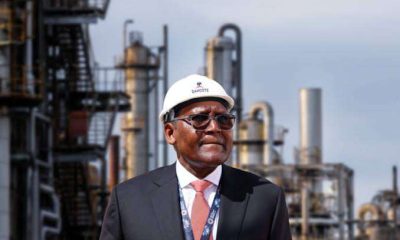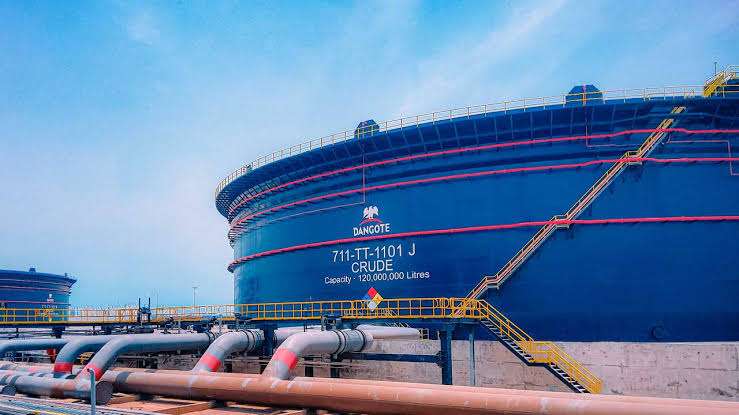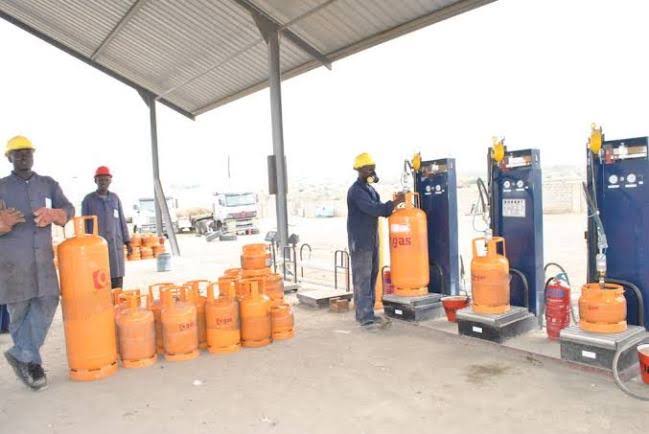Business
Dangote Refinery turns Nigeria to fastest growing maritime hub in the world

…as experts disown NPA figures on through-puts
The Dangote Refinery in the Ibeju-Lekki area of Lagos State has put Nigeria on the global maritime map by turning the nation into a major shipping hub for crude oil and refined petroleum products, Business Hallmark can report.
According to findings, the mammoth 650,000 barrels per day refinery in the Ibeju-Lekki area of Lagos is not just shaking up Nigeria’s maritime industry, it is on its way to becoming the leading global player in the industry based on the massive volume and tonnage of products it is presently shipping in and out of the country and the revenue it’s earning for government.
Commissioned on May 22, 2023 by former President Muhammadu Buhari and commenced operations in January 2024, the refinery had quickly become a major force by turning the country into a net exporter of refined petroleum products, a feat the four state-owned moribund refineries, Port Harcourt I and II, Kaduna and Warri refineries, could not achieve in over 50 years.
Not only has the refinery ensured fuel security in a country notorious for fuel scarcity, especially during major festivities, it has also been able to bring down the prices of petroleum products, especially diesel, which hit a high of N1,800 in November 2023.
However, the economic benefits of the Dangote Refinery, which are multi-layered and spanned beyond the oil and gas sector, are beginning to be felt in other sectors of the economy, particularly the maritime sector.
Nigeria has now emerged as the fastest growing maritime hub in the world by the International Maritime Organization (IMO) because of the number of vessels and volume of crude and refined petroleum products that pass through its ports.
Import, Export Boost
While importing millions of barrels of crude oil in large vessels from oil producing countries like Brazil, Equatorial Guinea, Angola and the United States as feed-stocks, Dangote had been exporting refined products from his refinery to several countries in Africa, Asia, Europe and North America including the United States, Spain, Saudi Arabia, Indonesia and South Africa.
According to the Half Year 2025 Shipping Report compiled by the Nigerian Ports Authority (NPA) made available to BH, the nation saw a massive surge in its crude oil imports in the period under review.
Specifically, 5,665,602 metric tons of crude oil bound for the Dangote Refinery entered the country in the first half of 2025, compared to 4,478,413 metric tons that entered Nigerian ports in the same period of 2024. The figure represents a massive surge of 26.5%, more than a quarter of the amount imported in 2024.
The NPA report added that 998,500 metric tons of Premium Motor Spirit (PMS) produced by Dangote Refinery passed through Nigerian ports in the first half of 2025. This figure represents a 7.45% fall, compared to the 1,078,912 metric tons exported in the first six months of 2024.
The NPA, however, failed to include data on other refined products from the refinery like diesel, aviation fuel, kerosene and naphta that exited the nation’s borders in H1’2025 in the report.
Conflicting Figures
However, experts in the nation’s shipping and oil and gas industry disagree with NPA’s figures, calling it inaccurate.
“I don’t know where they got their data from, but Dangote has been exporting around 1 million tonnes of PMS monthly in the last one year, so the NPA figures can’t be correct,” a source, who craved for anonymity disclosed.
The President of Dangote Group, Alhaji Aliko Dangote, had during an energy summit held in Abuja in September, disclosed that his refinery exported one million tonnes of premium motor spirit between June and July 2025. This largely contradicts the 998,500 metric tons figure for the first six months of 2025 presented by the NPA.
Reports suggest that the refinery, which has attained 610,000 barrels per day capacity, has also reshaped regional trade flows in the West African region.
For instance, the Lomé floating oil market dominated by international traders is now challenged by Dangote Refinery. Located off the coast of Togo with over two million barrels of stored petroleum products capacity, the hub is losing its allure as a regional hub to Lagos, Nigeria, which is gradually becoming an alternate regional centre for trading Dangote refinery products.
Gary Clark of S&P Global Commodity Insights, while commenting on the rising influence of Dangote Refinery, said the refinery now has the capacity to supply petroleum products across the region.
According to Clark, the refinery had exported significant quantities of diesel and jet fuel to West and Central African nations since it commenced production in January 2024.
“Prior to the ramping up of supply at the Dangote refinery, West Africa was very much reliant on imports from Europe and elsewhere. But now, obviously, with the Dangote refinery coming online, we see a lot of gasoil or diesel and jet fuel exported from that refinery, meeting West African and Central African demands.
“More than enough jet fuel has been exported to supply both the region and also more far-flung destinations as well,” the S&P official said.
While Dangote Refinery has been smiling to the bank with huge revenues from the sales of petroleum products, Nigeria is also reaping massively through levies on tankers and other statutory taxes on fuel bearing vessels that pass through Nigerian ports.
Revenue Windfalls
Some of the revenues realized by Nigeria from vessels bearing Dangote fuel include ship dues, towage fee and pilotage due.
The fees are collected on super tankers like the Very Large Crude Carriers (VLCCs), Ultra Large Crude Carriers (ULCCs), which supply imported crude oil to the refinery, and load refined products for export.
Port levies, BH learnt, are paid based on number of fleet and weight (tonnage) of vessels.
Meanwhile, all the vessels used by Dangote Refinery to bring in crude from abroad and those used by international oil traders like Vitol, Glenmore, Trafigura and PetroChina to lift fuel purchased from the refinery are VLCCs able to carry between 1 to 2 million barrels of crude oil.
With Dangote ramping up production, this means more revenue for government agencies in the maritime industry like NPA and NIMASA, making maritime experts to project that the refinery has the potential to become the biggest revenue source for the NPA.
Speaking on the development, a maritime expert and consultant, Oluwabunmi Ogunjimi, said crude oil exploration and the logistics of refined products brought little or no shipping value to the country before the establishment of Dangote Refinery.
“Let us look at it from the perspective of the fact that before, nothing was being exported as far as refined petroleum products are concerned, we were only exporting crude. A lot of our feed-stocks have been contracted.
“What Dangote has done is that he has created a downstream industry here because the whole idea of crude oil coming here is economic activities down the value chain, starting from shipping, meaning that more vessels are coming here to deliver crude oil and load refined products.
“These vessels pay ship dues, towage fees, pilotage due and other taxes. You will be shocked to know that Dangote Petroleum Refinery is now one of the major revenue earner for NPA because the vessels that call at our waters are huge, Very Large Crude Carriers (VLCC), and ship dues are paid based on the size of the vessels.
“Nigerian ports do not even have the capacity for Dangote Refinery’s products. He is using Single Buoys Mooring, SBM, underground pipes, which is about 30 kilometres from the refinery to the vessels offshore to transport crude oil and 30 kilometers backward. Crude comes in, it is refined and it goes out to the global market.
“Either way, Dangote is creating economic activities in the shipping sector, if you consider the shipping sector, the economic activity is unbelievable, both in and out. Remember that these vessels that come to Nigeria would have had no business coming to Nigeria in the first place.
“He is providing shipping activities that come with commercial contents, more ships, tankers are coming here to deliver crude, providing jobs, increasing ship movements, increasing our tonnage and value for the International Maritime Organisation (IMO), so it is a win-win for Nigeria.
“In IMO, one of the ways you are ranked is through your tonnage. So, you can imagine the vessels bringing in crude oil, to the ones coming to load refined products and what Dangote produces”, Ogunjimi noted.






